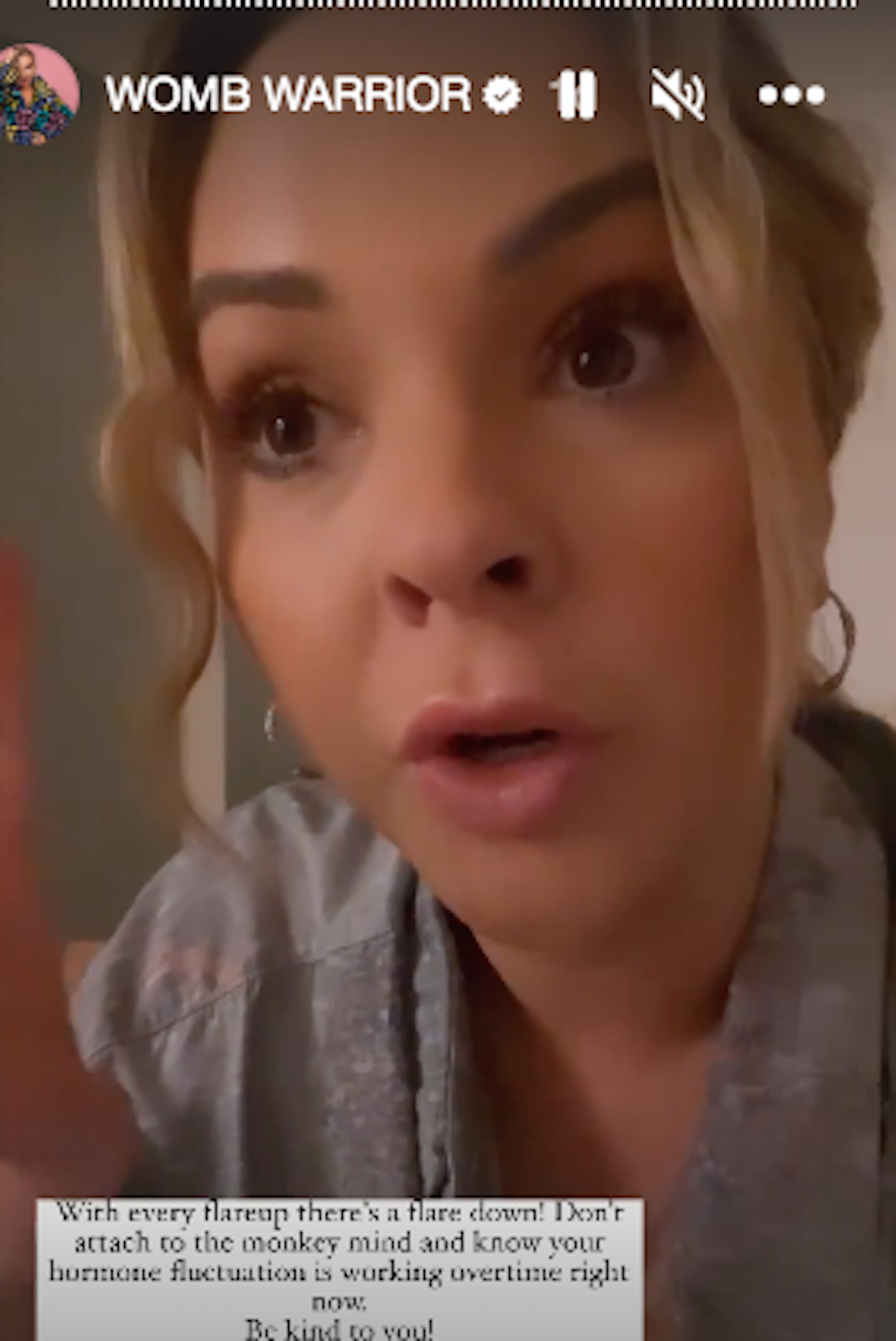Learning About PMDD
- TV personality Angie Kent, 33, is living with PMDD (Premenstrual Dysphoric Disorder), a health issue that’s likened to premenstrual syndrome (PMS) but is more serious.
- The U.S. Department of Health & Human Services’ Office On Women’s Health (OOWH) explains premenstrual dysphoric disorder (PMDD) is a health issue that is similar to premenstrual syndrome (PMS) but is more serious.
- It affects up to 5% of women in their childbearing years and the cause of PMDD or PMS is unknown. However, hormonal changes due to the menstrual cycle and serotonin levels in the brain may contribute to the health issue.
- If you’re dealing with body issues or a type of health issue that’s affecting how you feel about yourself, it’s important to know that you are not alone.
- There are resources (like mental health professionals or patient advocates) available if you need them, and many changes (like hair loss or changes to your skin or bloating) are only temporary.
The 33-year-old Australian TV personality, known for appearing on “Gogglebox,” “I’m a Celebrity…Get Me Out of Here!” and the Australian version of “Dancing With The Stars,” has been talking about her illness since she was diagnosed in hopes to support others and raise awareness.
Read More
Noting that there are way more symptoms of this health issue than she’s described, she decided to give a “little shout-out and recognition” to others living with PMDD.
She admitted that when her body swells up, her body dysmorphia kicks in and she thinks to herself, “I look like a potato with eyes and a mouth.”
Kent continued, urging anyone feeling like she does, “Um … IT'S NOT YOU. It’s just your hormones, and it’s all over the place, and this too shall pass.”
She reportedly captioned her post, “With every flareup, there's a flare down! Don't attach to the monkey mind and know your hormone fluctuation is working overtime right now. Be kind to you. This too shall pass my sweet potatoes.”

Kent, who also suffers from endometriosis (when tissue, like the tissue that normally lines the inside of the uterus, known as the endometrium, grows on the outside of the uterus, which can cause debilitating pain), first went public with her PMDD diagnosis last year.
She previously took to Instagram to express why she’s working to spread awareness for the health condition, which she has dubbed a “chronic invisible illness.”
Mental Health & Body Image
- Mental Health: Coping With Feelings of Anger
- How to Be Realistically Optimistic: Coping With Mental Health Long-Term
- Mental Health: Understanding the Three Wellsprings of Vitality
- Body Image, Sex, and Adjusting to a New Normal After Cancer Treatment
- SurvivorNetTV Presents: ‘SN & You – Body Image: Embracing Your Body’
“I've been on quite the roller coaster with my reproductive invisible illnesses and it wasn't until I started working with an amazing naturopath which then lead me to an even more amazing women’s health practitioner that I started to understand my body and what I was experiencing,” Kent, who was treated for endometriosis last year, captioned another post.
“Through my work with magical people I have cultivated on this forever changing experience, and my own healing through growth in awareness with a magic facilitator, I have found that I don't have to live in fear and pain every day.”
She added, “I want the same for all the womb warriors continually suffering in silence. While society is getting better at discussing periods…. We still have a LONG way to go. …Knowledge is power but shared knowledge is even more powerful. You're not alone.”
Premenstrual Dysphoric Disorder (PMDD)
According to the U.S. Department of Health & Human Services’ Office On Women’s Health (OOWH), premenstrual dysphoric disorder (PMDD) is a health issue that is similar to premenstrual syndrome (PMS) but is more serious.
It affects up to 5% of women in their childbearing years and most women living with PMDD may experience depression or anxiety. Additionally, what causes PMDD or PMS is unknown, however, hormonal changes due to the menstrual cycle and serotonin levels in the brain may contribute to the health issue.
“PMDD causes severe irritability, depression, or anxiety in the week or two before your period starts,” the OOWH explains. “Symptoms usually go away two to three days after your period starts. You may need medicine or other treatment to help with your symptoms.”
As per the OOWH, symptoms of PMDD may include:
- Lasting irritability or anger
- Feelings of sadness or suicidal thoughts
- Feelings of anxiety
- Panic attacks
- Mood swings
- Lack of interest in daily activities and relationships
- Difficulty thinking or focusing
- Tiredness or low energy
- Food cravings
- Difficulty sleeping
- Cramps, bloating, breast tenderness, headaches, and joint or muscle pain
Body Image & Self-Acceptance
Many cancer survivors, or women dealing with health issues like PMDD, struggle with body image issues.
SurvivorNetTV Presents: ‘SN & You Body Image: Embracing Your Body’
It's important to know that you are not alone, there are resources (like mental health professionals or patient advocates) available if you need them, and many changes (like hair loss or changes to your skin or bloating) are only temporary.
Survivor Bianca Muniz, who was diagnosed with cancer for the first time when she was just 11 years old, said she really struggled initially with the changes cancer made to her body, especially since she is a singer and has always performed on stage.
“Once I started treatment, I started getting these really bad breakouts on my face, and then I would try to cover it up with makeup,” Muniz previously told SurvivorNet.
Celebrity Stylist Ann Caruso on Beauty and Femininity After Cancer
“I tried all these different skin regimens to try to make it better, and I made it worse. And I'm a performer. I am on stage performing in front of people. So to have this so just in your face, everyone can see it, that was very hard for me to get over … It took a really long time for me to finally feel OK about it and accept that this is going to be there for a while.”
Ann Caruso, a celebrity stylist, also previously spoke with SurvivorNet about self-acceptance, an essential part of living with any type of health battle and cancer, regardless of how severe.
“Femininity is a state of mind,” Caruso told SurvivorNet. “Society has us thinking that our breasts are what makes us sexy. You know, there are so many other things. There's touch, there's our eyes a glance, the way we speak. It's the curve of our body, it's the way that we think. There are so many special things about being a woman.”
Coping With Body Changes
Dr. Marianna Strongin, a New York-based licensed clinical psychologist, previously told SurvivorNet that it's common for survivors to struggle with the physical part of their health journey.
“Your body has changed and represents this difficult chapter in your life and simply accepting all of that is far too simple,” Strongin says.
She suggests you sit with your body in front of the mirror and spend time looking at the parts you truly love, adding, “Give them time, honor them and then thank them.”
Then spend time looking at the part (or parts) of your body that has been impacted by cancer or disease, such as your chest where your breasts have been removed, or your head where there is no longer hair.
"”At first you may experience a flood of emotions this is expected and normal. As you allow yourself to spend more time looking at all of you, you will begin having a new relationship with your body,” Strongin explains.
“It may not happen immediately, but with time you can begin honoring and thanking that part of your body by creating a more accepting relationship with yourself.”
Strongin, who says body image is about both the mental picture you have and how you feel when you look in the mirror, added, “Therefore, it is important that you create a ritual and practice that allows you to better accept your cancer journey both emotionally and physically.”
Questions to Ask Your Doctor
If you're experiencing physical changes during your health journey, you might want to consider asking your doctor these questions:
- I am experiencing certain bodily changes. What exactly is causing them?
- Are there ways to manage or minimize these changes?
- I'm struggling to cope with the changes to my body. Is there someone I can talk to about it?
- Is there a social worker here who can help connect me with a therapist?
- What resources are available to help me find a local support group?
Contributing: SurvivorNet Staff
Learn more about SurvivorNet's rigorous medical review process.


